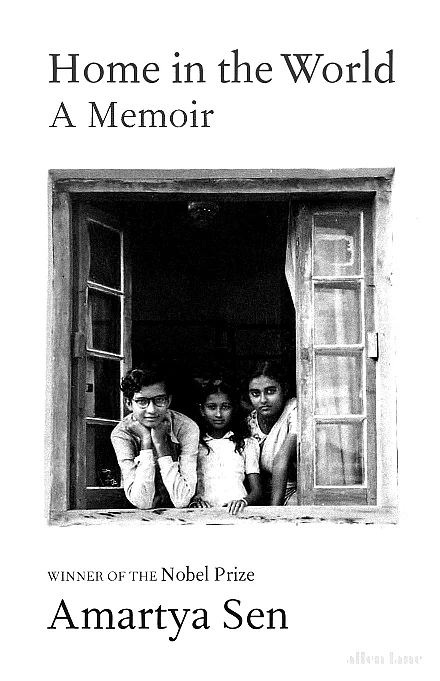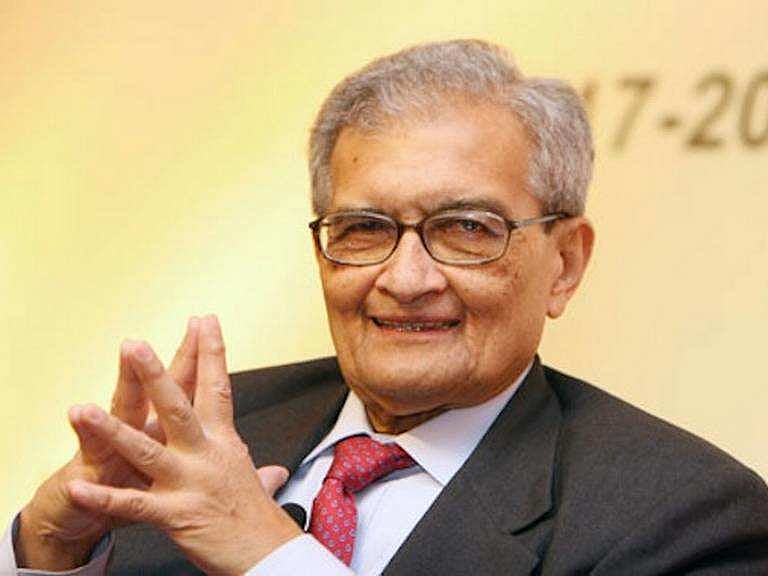Amartya Sen's memoir: Everywhere at home, never home alone
The remarkable memoir of a remarkable man of our times makes for delightful reading and offers breath taking insights. It is also remarkable for the complete absence of bitterness

Memory and memoir are not the same, the reader is reminded at the very outset. The self-indulgence of grazing one’s memory-Smriticharan in Sanskrit or remembering—writes Amartya Sen is not the same as writing a memoir aimed at others. So, his latest book, Home in the World, is a memoir and not an autobiography.
He seemed to have no concept of ‘home’, a BBC interviewer had once told him, he recalls. Sen’s explanation that he felt perfectly at home in Cambridge, in Harvard or in Santinketan, Calcutta, Delhi, Dhaka or Mandalay had left the interviewer unconvinced. He continues to be confronted with the question, ‘Where is your home’, even as he waits to complete 88 years of age in November. But he is clearly content to be a citizen of the world, at home everywhere but holding on to his Indian Passport.
It could just be a coincidence that his grandfather’s house in old Dhaka was called Jagat (World) Kutir and he spent 10 years schooling at Santiniketan where Rabindranath Tagore had set up his university Visva (World) Bharati (Wisdom).
Visiting places and exchanging ideas and learning about each other contributed to both knowledge and peace, he points out, from ancient times. He cites Iranian mathematician Al-Biruni who spent considerable time in India in the 11th Century.
The Iranian’s affection for Indians comes through in his book Tarikh-al-Hind, Sen writes before quoting Al-Biruni saying, “Indian mathematics is very good; but the most unusual gift Indian intellectuals have is something quite different: it is their ability to talk eloquently on subjects about which they know absolutely nothing!”
The memoir sparkles with Sen’s gentle humour, which not just elicits a smile but makes the reader pause and think. When he was felicitated by his school in Dhaka, St Gregory’s, after he was awarded the Nobel Prize in 1998, the then Head Master apparently fished out Sen’s answer books from the archives. While the Head Master had planned to make a grand display of the Nobel Laureate’s almost 60-year-old answer book, he desisted after discovering that Sen had come 33rd in a class of 37.
The Head Master, recalls Sen, quipped that he must have become a ‘good student’ after leaving St. Gregory’s. Sen agreed. “I became a good student only when no one cared whether I was a good student or not,” he recalls.
***
He generously recalls how Santiniketan shaped him and where curiosity rather than competitive excellence was encouraged. Outdoor classes were meant to place the students in the middle of day-to-day life. There were distractions and noise and not all students agreed about its beneficial effects. But while they hotly debated the issue, Sen remembers, the consensus was that their learning was not really impaired by the absence of walls. He credits his ability to work at crowded railway stations and at airports to this early training on concentration and focus.
At Santiniketan, nobody quite cared about grades and examinations. Occasionally examinations would not be held at all. And classes on literature would often flit from the contemporary to ancient Indian literature before shifting to Latin American or literature from the Far East. Sen recalls a teacher exclaim about his sister, “she is quite original though her grades are also quite good”. Teachers encouraged students to be curious and be themselves.
Sen’s grandfather, Kshiti Mohan Sen, was a formidable Sanskrit scholar. He had also collected the songs of Kabir sung by people in rural India, not just Uttar Pradesh. Kabir had not written them down and therefore the oral versions often differed. But they were what kept Kabir alive and lent meaning to his philosophy. Sen owes his love for Sanskrit, Kabir and Bauls of Bengal who too like Kabir drew from both Hindu and Muslim culture, to his grandfather.

Physical punishment was of course forbidden at Santiniketan. It was not just considered barbaric to hit a child but it was felt that children must be explained why it was important to do the right thing. Teachers were required to reason with children and sometimes the experience could get exasperating, recalls Sen and mentions an apocryphal story he was told about his grandfather.
On a rare occasion when Kshiti Mohan Sen was asked to engage a class of six-year-olds, one boisterous boy would repeatedly sneak up to the lectern and place a shoe there. He would not stop even after the teacher patiently and repeatedly explained why this was not right. The irritated teacher finally snapped that his conduct deserved a tight slap. The precocious but bright student reminded the teacher that physical punishment was prohibited ‘ on the soil of Santiniketan’.
The teacher, the story went, then pulled up the student by his collars and asked the boy to confirm that his feet were no longer on the ‘soil of Santiniketan’. Once the boy confirmed this, he was administered a light slap before he was restored on the soil of Santiniketan!
***
Sen takes the opportunity to reflect in the memoir a range of issues that continue to confound him. He is, for example, unable to reconcile his memories of Myanmar with the brutalities perpetrated by both the military and the people there.
He has happy memories of Myanmar where his father taught Chemistry for three years on leave from Dhaka University. He remembers the people being warm, kind and friendly. Was the natural kindness and warmth then an illusion? What could have changed a people who were constantly laughing, smiling and singing to perpetrate atrocities on the Rohingyas?
There is a global lesson, he writes, for the ‘formerly secular’ India and the world on how propaganda can poison a people’s mind. While most people in Myanmar, he concedes, now believe that Rohingyas had migrated from Bangladesh, the fact is that the retreating British handed over Arakan (Rakhine) to Burma after the second world war.
The hatred for Muslims in Myanmar and India, for immigrants in Hungary, for Gays in Poland and for Gypsies elsewhere in Europe are examples of the world-wide trend of intolerance—a theme that runs through the book.
In an illuminating passage, the writer reflects on differences between Rabindranath and Mahatma Gandhi. When Gandhi attributed the earthquake in Bihar of 1934 to divine retribution for the practice of untouchability, both Tagore and Nehru reacted sharply. Tagore wrote candidly to the Mahatma and asked the rationale for linking a natural calamity to punishment by God. Why the punishment for an age-old sin, why in Bihar and not elsewhere and why the earthquake and not something else?
The Mahatma eventually put an end to the controversy by saying he could not answer for God. But, Sen writes wryly, the Mahatma seemed ready to speak on behalf of God on some issues but not on others.
Tagore also questioned Gandhi’s obsession with the spinning wheel. The primitive Charkha could not possibly elevate the mind and was a dreary experience for most people, he felt. Sen is not so sure in hindsight. Perhaps it was the Mahatma’s way of identifying with the ‘worker’.
The remarkable memoir of a remarkable man of our times makes for delightful reading and offers breathtaking insights. It is also remarkable for the complete absence of bitterness. Even while writing on the failed experiment of reviving the ancient university of Nalanda, Sen does not even refer to the shabby treatment given to him by the Modi Government.
Amartya Sen is clearly much more than a philosopher and an economist. A renaissance man in the true sense of the word, his interests and insights extend to language, literature, people and culture.
When K.N. Raj asked him if he would like to teach at the Delhi School of Economics, he was told that he could occupy the chair of Dr VKRV Rao but only if Dr Rao approved of him. Dr Rao invited Sen, then in his twenties, to a South Indian lunch at home followed by coffee, at the end of which he was asked when he could join.
This review leaves out almost half the book that deals with his life and work in Cambridge and at Harvard. But the modestly priced book (Trust Sen to have insisted on it) needs to be translated into Indian languages soon.
Follow us on: Facebook, Twitter, Google News, Instagram
Join our official telegram channel (@nationalherald) and stay updated with the latest headlines